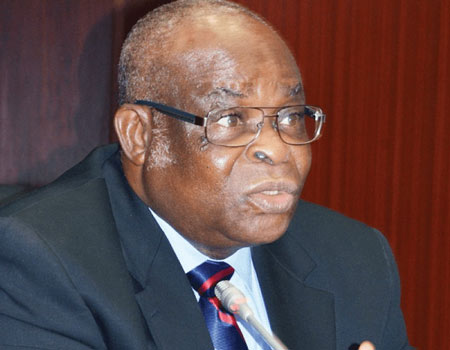The controversial first-of-its-kind suspension of the Chief Justice of Nigeria, Justice Walter Samuel Nkanu Sylvester Onnoghen on Friday by President Muhammadu Buhari is fulfilling an ambition in a way and possibly, in an eerie way, settling a lingering I-senior-you, you-no-senior-me dispute, incidentally in a way that may further make a mockery of whatever effective judicial institution the president said he was aiming to build.
Onnoghen’s suspension as CJN, dictatorship taken too far ― Atiku
Ever before Onnoghen became the number one jurist in the land, the man who succeeded him in acting capacity on Friday, Justice Ibrahim Tanko Mohammed, had always claimed to be senior on the Bench, to his suspended boss, and should be succeeding the then-outgoing CJN, Justice Mahmud Mohammed. The not-too silent seniority war being waged mainly from Tanko’s end, got to a head during an official function at the National Judicial Institute (NJI) when Tanko openly demanded from Mahmud that he be allowed to sit next to him, as the most senior justice of the Supreme Court, ahead of Onnoghen, who then, was the most-senior, officially-recognized, by the judiciary leadership.
An enraged Mahmud told Tanko point-blank that Onnoghen got to the Supreme Court ahead of him and going by tradition, the jurist from South-South, was officially the most senior of the court. Despite the matter being resolved in Onnoghen’s favour, Tanko’s camp was said to be upbeat, with sources claiming that he had been assured by the powers-that-be in Buhari’s government, that he would be appointed as Mahmud’s successor-in-office, ahead of Onnoghen.
Following unsuccessful attempts, moves, plots and plans, to stop Onnoghen’s enthronement, the suspended CJN got an early lead, but Tanko can safely be assumed to be having the last laugh, starting from yesterday’s evening. Only time will tell how long his victory lap, would last.
The Buhari/Onnoghen/Tanko triangular saga is reminiscent of the crisis of confidence between two former top justices of the apex court, Justices Mohammed Lawal Uwais and Salihu Modibbo Alfa Belgore. The duo fell out when Uwais as CJN was embroiled in a couple of cases, including the one in which a lawyer pointedly accused him of infractions in a particular case, performing the courageous vilification act in an open court, with Uwais presiding.
Another contract scandal for the computerization of the operations of the Supreme Court, was also raging and Uwais felt it was Belgore squealing on him and his family. At a press conference in his office, Uwais pointedly accused Belgore of being the brain behind the stain on his shining judicial armour. He refused to embark on the traditional three-month retirement leave, which would have paved the way for Belgore to spend nine months as CJN, instead of the six months his age allowed him to spend in office when he assumed office. In fact, the initial gentleman agreement between the duo that Uwais, the longest-serving CJN in history, would quit a year before his retirement, to allow Belgore spend a year and a half, collapsed under the strain of the war between them.
As president, Olusegun Obasanjo reportedly waded in when the crisis was almost out of control and was said to have invited the duo for a dinner at the presidential palace. After the dinner, he reportedly compelled Belgore to ride in his boss’s car and see him home. He reportedly demanded a situation report. While the duo, out of office, may not have resumed as the best of friends again, the crisis while in service, was said to have been contained and curtailed with Uwais, as the NJC chairman, eventually recommending Belgore to the president for appointment as his successor-in-office.
Another judicial crisis also regarded as the most damaging, until now, was the battle between former CJN, Justice Aloysius Katsina-Alu (now late) and now-retired President of the Court of Appeal, Justice Isa Ayo Salami. While Salami, without doubt, won the battle in the public opinion court, as the CJN was deemed to be in the wrong for wanting to forcefully promote Salami to the apex court, Salami, procedurally lost when the National Judicial Council (NJC), empowered to handle the discipline and sanctioning of judges, suspended him from office. Katsina-Alu, as the NJC chairman, recused himself from the sanction proceedings.
The precedents are now coming into play with yesterday’s unprecedented move by the president and forgery is now being alleged, since Buhari in a statement claimed he was acting on the order of the Code of Conduct Tribunal whose proceedings in the trial of Onnoghen for alleged contravention of the Code of Conduct Bureau provisions on asset declaration, were constitutionally halted by the Court of Appeal on Thursday.
Apart from the legality of the president’s action without recourse to the NJC, the process leading to the issuance of the controversial order, is getting a lot of questions being asked. A legal practitioner who was in attendance at the aborted proceedings of the Tribunal on Tuesday, rhetorically asked last night “when and where was the application for the suspension of Onnoghen heard, before it was granted and issued to the Buhari administration. Justice Danladi Umar (CCT chairman) himself in his ruling said the issue of jurisdiction must first be settled before the removal request and the enthronement of Tanko, could be entertained. On Thursday, Court of Appeal stopped the trial, pending the determination of Onnoghen’s appeal. So, when was the application heard and when was the order issued to the government? Th CCT is a fraud, I will never appear before it again.”
The Onnoghen saga, is billed to become the defining moment for the judiciary that is undergoing its most-trying time. The days ahead, also appear unpredictable for all stakeholders, including the president, who may also be consumed by the aftermath political crisis, just like former President Jonathan, who with a stroke of pen, in endorsing even, the lawful suspension of Salami, unified both local and international opposition in a way that his defeat became predictable months before the presidential election he lost.
It is almost a general consensus that moving against Onnoghen at a time like this, especially 24 hours to the swearing-in of judges (a function Tanko would perform today) picked to handle petitions arising from the coming poll, is nothing but political and political consequences are expected to manifest.
In 21 days, Buhari will be a candidate in an election, bound to become possibly the most controversial and contentious in the history of the nation’s electoral process, since the two leading candidates; Buhari and Atiku Abubakar of PDP, have refused to commit themselves to accepting the outcome of the election, which is also likely not to be free and fair.
All eyes that should be on the judiciary then, are now already on it and the monster that the Supreme Court under Onnoghen had created in Umar’s CCT, a quasi-judicial body under the presidency, is still ravaging, with no one knowing if its billowing fire would ever burn moderately and constitutionally.
The first season has ended…The world awaits the next phase.






